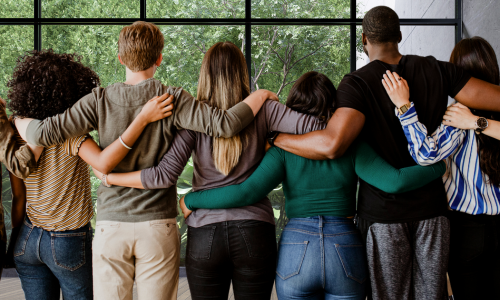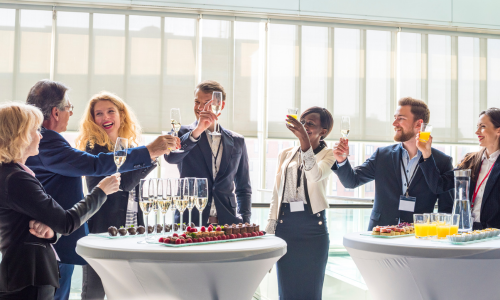
In today’s rapidly evolving event landscape, inclusivity is more than just a buzzword—it’s a necessity.
At Huddle, we believe that creating events that cater to all attendees, regardless of their mental health status or neurodiversity, is not only the right thing to do but also a pathway to more successful, impactful gatherings. As we celebrate Mental Health Day, let’s explore how we can make our events more inclusive and welcoming for everyone.
Understanding Neurodiversity: A New Perspective on Inclusion

Neurodiversity is a concept that recognizes and respects neurological differences as a natural variation in human diversity. It’s estimated that one in 44 people has some form of neurodiversity, including conditions such as autism, ADHD, dyslexia, and Tourette syndrome. This growing movement sees accommodating all processing abilities as a diversity and inclusion issue rather than a disability and accessibility concern.
Just as we can’t control the color of our skin, we can’t control how our brains work. Therefore, it’s crucial to approach neurodiversity with the same commitment to equity that we apply to race and gender issues. As event professionals, we have a unique opportunity to lead by example and create a playbook for inclusivity that can inspire change across various disciplines.
Simple Steps Towards Inclusive Events

Creating a more inclusive event doesn’t have to be complicated or expensive. Here are some straightforward strategies to get started:
- Open Communication: In your event registration process, clearly state that your event is safe and considerate of all neuro types. Encourage attendees to reach out and let you know how you can support them. This simple act of asking is free but can make a world of difference.
- Flexible Scheduling: Implement longer breaks between sessions to allow attendees to recharge and renew. This “scaffolding” approach benefits everyone, not just neurodivergent individuals.
- Create Safe Spaces: Make it okay for attendees to step away or unplug when needed. This understanding approach fosters a more comfortable environment for all.
- Educate Your Team: Train your event staff on mental health awareness and appropriate responses to potential crises. Resources like Mental Health Awareness Training and Mental Health First Aid can be invaluable.
Tailoring Your Approach: In-Person, Virtual, and Hybrid Events
In-Person Events

While in-person events are familiar territory for many planners, expectations have shifted in recent years. Consider these strategies:
- Leave ample time between sessions for socializing and resting.
- Implement clear mask and social distancing policies to put attendees at ease.
- Explore non-traditional venues that engage with local culture.
- Include small breakout sessions to facilitate meaningful connections.
Virtual Events
Virtual events, which gained prominence during the pandemic, require a different approach:
- Encourage attendees to keep their cameras on to promote engagement.
- Incorporate interactive elements like polls and games to boost participation.
- Invite compelling speakers to maintain focus and interest.
Hybrid Events
For hybrid events, strive to create an equitable experience for both in-person and virtual attendees. This might involve:
- Using technology that allows seamless interaction between physical and virtual participants.
- Ensuring that online attendees have access to the same networking opportunities as those on-site.
- Providing clear instructions for both types of attendees to navigate the event successfully.
Innovative Ideas for Mental Health-Focused Events

- Host a Mental Health Speaker or Workshop: Dedicate a session to mental health awareness. This could involve a professional sharing stress management techniques or an inspirational speaker discussing positive outlook strategies.
- Offer Mental Wellness Stations: Set up areas throughout your venue where attendees can engage in activities like mini-massages, aromatherapy, yoga, meditation, or even simple coloring stations.
- Incorporate a Mental Health Giveback Element: Support mental health charities or research foundations through your event. This could involve donating a portion of registration fees or organizing an on-site fundraiser.
- Encourage Physical Activity: Host optional yoga classes or fun runs. Incorporate short dance breaks between sessions or extend break times to allow for brief walks.
- Explore the Great Outdoors: Leverage venues with outdoor spaces. Even if you can’t host entire sessions outside, encourage attendees to step out during breaks. Natural light and views can significantly boost mood and mental well-being.
- Bring on the Puppies!: Partner with a local animal shelter to create a puppy-petting station. Interacting with animals can decrease stress hormones and increase bonding hormones, not to mention the pure joy it brings!
The Impact of Inclusive Design

By designing events with neurodiversity in mind, we create spaces that are more comfortable and productive for everyone. When we understand and accommodate the various ways people process information and interact with their environment, we allow all attendees to more fully be themselves.
This approach fosters an atmosphere of tolerance and patience, which in turn leads to more meaningful interactions and successful events. Remember, what neurodivergent individuals need is often what everyone needs: space to process, time to recharge, and an environment that respects individual differences.
Conclusion: A Call to Action
As event professionals, we have the power to shape experiences that can change perceptions and improve lives. By making our events more inclusive for mental health and neurodiversity, we’re not just improving individual experiences—we’re contributing to a more understanding and accepting society.
At Huddle, we’re committed to leading this charge. We invite you to join us in reimagining events as spaces where everyone, regardless of their neurological makeup, can feel welcomed, valued, and empowered to participate fully.
Let’s embrace the beautiful diversity of human cognition and create events that truly cater to all. After all, when we design for the extremes, we benefit the means—and isn’t that what great event planning is all about?
Remember, the journey towards truly inclusive events is ongoing. We’d love to hear your thoughts and experiences. How have you made your events more inclusive? What challenges have you faced, and what successes have you celebrated? Share your stories and let’s continue this important conversation together.
Together, we can make every event a celebration of neurodiversity and mental health awareness.